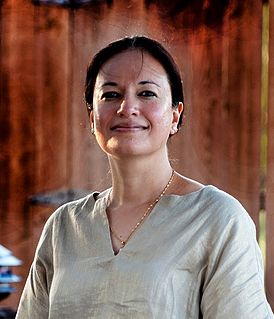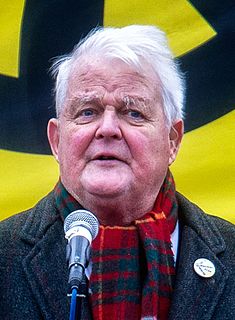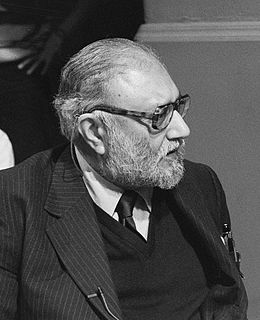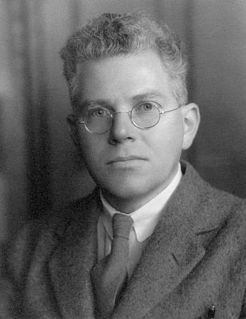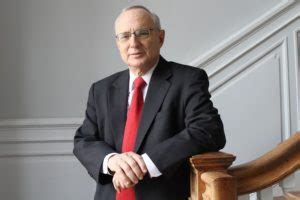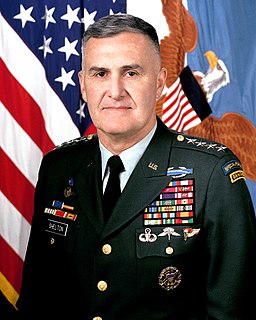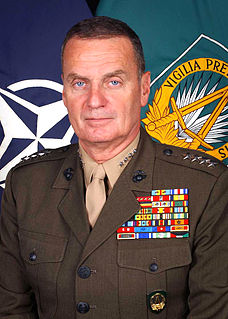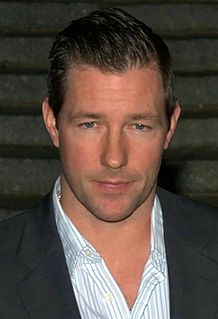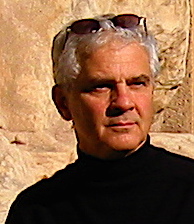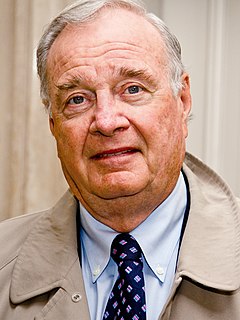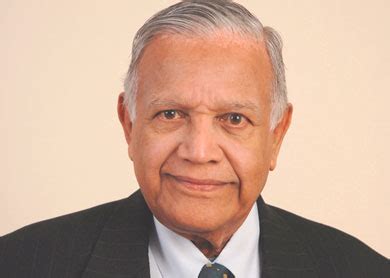Top 1200 Nuclear Proliferation Quotes & Sayings - Page 2
Explore popular Nuclear Proliferation quotes.
Last updated on December 19, 2024.
The challenge of preventing any further proliferation of nuclear weapons is just such a trial in the quest for world peace, one that cannot be achieved if we are defeated by a sense of helplessness. The crucial element is to ensure that any struggle against evil is rooted firmly in a consciousness of the unity of the human family, something only gained through the mastery of our own inner contradictions.
As far as U.S. intelligence knows, Iran is developing nuclear capacities, but they don't know if they are trying to develop nuclear weapons or not. Chances are they're developing what's called 'nuclear capability,' which many states have. That is the ability to have nuclear weapons if they decide to do it. That's not a crime.
Where psychedelics comes together with that is that it's going to require a transformation of human language and understanding to stop the momentum of the historical process, to halt nuclear proliferation, germ warfare, infantile 19th century politics, all these things. It cannot be accomplished through a frontal assault upon it by political means.
Issues of energy, climate change, nuclear arms control and non-proliferation are all big deals. These are problems that we have to get right globally, not just nationally, and there are big benefits in cooperating, in terms of sharing costs, in terms of sharing risks, in terms of propagating the best answers.
The creation of India and Pakistan were pyrrhic victories for their denizens because the political, socioeconomic, psychological, and culture havoc wreaked by that momentous event is reflected in those pogroms, ethnic cleansing, proliferation of nuclear weapons, poverty, and riots that continue to cause seismic tremors in the Indian subcontinent.
We have to realize that science is a double-edged sword. One edge of the sword can cut against poverty, illness, disease and give us more democracies, and democracies never war with other democracies, but the other side of the sword could give us nuclear proliferation, biogerms and even forces of darkness.
I, who had been in favour of nuclear energy for generating electricity ... I suddenly realised that anybody who has a nuclear reactor can extract the plutonium from the reactor and make nuclear weapons, so that a country which has a nuclear reactor can, at any moment that it wants to, become a nuclear weapons power. And I, right from the beginning, have been terribly worried by the existence of nuclear weapons and very much against their use.
At this crucial crossroads of history, we join to call on the world to recognize that violence begets violence; that nuclear proliferation benefits no one; that we can, we will, and we must find other ways to protect ourselves, our nations and our future: for it is not sufficient to have peace in our time, but, instead, we must leave a peaceful world to our children.
On January 20, 2017, Trump will be sworn in as the 45th president of the United States, and he will be given the nuclear codes and the power to launch the U.S. nuclear arsenal, which is comprised of some 7,000 nuclear weapons. A military officer will always be close to Trump, carrying the nuclear codes in a briefcase known as the "football."
I come to this debate, Mr. Speaker, as one at the end of 10 years in office on the Permanent Select Committee on Intelligence, where stopping the proliferation of weapons of mass destruction was one of my top priorities. I applaud the President on focusing on this issue and on taking the lead to disarm Saddam Hussein... Others have talked about this threat that is posed by Saddam Hussein. Yes, he has chemical weapons, he has biological weapons, he is trying to get nuclear weapons.
We can talk about the economy, we can talk about Social Security. The biggest problem this world has is nuclear proliferation. And we have a country out there, North Korea, which is sort of wacko, which is not a bunch of dummies. And they are going out and they are developing nuclear weapons. And they're not doing it because they're having fun doing it. They're doing it for a reason. And wouldn't it be good to sit down and really negotiate something and ideally negotiate? Now, if that negotiation doesn't work, you'd better solve the problem now than solve it later.
That is why, as one who values the U.S.-Israel relationship, and loves Israel, I was near tears throughout the Prime Minister’s speech — saddened by the insult to the intelligence of the United States as part of the P5 +1 nations, and saddened by the condescension toward our knowledge of the threat posed by Iran and our broader commitment to preventing nuclear proliferation.
The world has today 546 nuclear plants generating electricity. Their experience is being continuously researched, and feedback should be provided to all. Nuclear scientists have to interact with the people of the nation, and academic institutions continuously update nuclear power generation technology and safety.
Donald Trump believes that the world will be safer if more nations have nuclear weapons. And he's said Saudi Arabia should get them, Japan should get them, Korea should get them. And when he was confronted with this, and told, wait a minute, terrorists could get those, proliferation could lead to nuclear war, here's what Donald Trump said, and I quote: "Go ahead, folks, enjoy yourselves."
I would like to clarify that our opposition to the Nuclear Non-Proliferation Treaty is not related to any consideration involving Pakistan. Our position on this important issue is consistent and principled. We are not ready to sign the NPT as it stands today because it is blatantly discriminatory in character.
I don't want to use the term "nuclear weapons" because those people in Iran who have authority say they are not building nuclear weapons. I make an appeal to the countries who do have nuclear weapons. They don't consider them a nuclear threat. But let's say a country that doesn't have nuclear weapons gets involved in building them, then they are told by those that already have nuclear weapons that they oppose [such a development]. Where is the justice in that?
I worry most about proliferation of weapons of mass destruction in such a way that they could be acquired by non-governmental organizations, like terrorist groups, especially the radical groups. When a nation state has a nuclear weapon, it's a little bit easier to control the use of it, but for non-governmental groups it's much more difficult.
Maybe one thing that has happened is that the claims of non-partisanship of the mainstream media have been a little bit exploded. Mostly I'd say what, if anything has caused the change, are just the obvious technological changes - proliferation of easier access to getting your opinions out and the proliferation of media.
Our people are dying, poverty and unemployment are on the rise, but the rest of the world says that Musharraf is needed because [only] he can stop nuclear proliferation, [only] he [can launch] an operation in the tribal areas. So he manipulates and dangles some kind of carrot in front of the world all the time. This is not good for the people [of Pakistan], and I think the world has got it all wrong.
Donald Trump believes that the world will be safer if more nations have nuclear weapons. He's said Saudi Arabia should get them, Japan should get them, Korea should get them. And when he was confronted with this and told, wait a minute, terrorists could get those, proliferation could lead to nuclear war, here's what Donald Trump said, and I quote, go ahead, folks, enjoy yourselves.
The way the United States intelligence community operates is it doesn't limit itself to the protection of the homeland. It doesn't limit itself to countering terrorist threats, countering nuclear proliferation. It's also used for economic espionage, for political spying to gain some knowledge of what other countries are doing.
In the area of international security, taking into account that the United States and Russia are the largest nuclear powers: We are ready to jointly work to strengthen the non-proliferation regime for weapons of mass destruction and their means of delivery. We are ready to work together, and much closer than before, on the problem of fighting terrorism, international terrorism, and here we certainly have vast opportunities.
But elimination will only happen if all countries - nuclear and non-nuclear states - genuinely work towards this result. Nuclear states must abolish their arsenals, as was indicated by the unanimous opinion of the international Court of Justice, the highest international tribunal. The five nuclear states seem to expect others to refrain from obtaining bombs while at the same time maintaining their own caches of deadly weapons.
The next most dangerous thing [after nuclear proliferation] is probably... global warming, and then, right behind that are overpopulation -- we need to get serious about family planning-and trying to alleviate poverty, to get clean, renewable energy, probably with solar panels to the billion and a half people in the world who don't have access to electricity.
The bottom line on nuclear weapons is that when the president gives the order, it must be followed. There's about four minutes between the order being given and the people responsible for launching nuclear weapons to do so. And that's why 10 people who have had that awesome responsibility have come out and, in an unprecedented way, said they would not trust Donald Trump with the nuclear codes or to have his finger on the nuclear button.
The foes now are universal - poverty, famine, religious radicalization, desertification, drugs, proliferation of nuclear weapons, ecological devastation. They threaten all nations, just as science and information are the potential friends of all nations. Classical diplomacy and strategy were aimed at identifying enemies and confronting them. Now they have to identify dangers, global or local, and tackle them before they become disasters.




